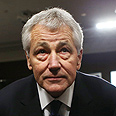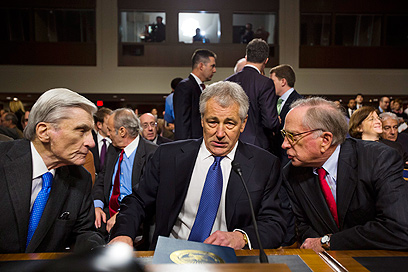
The US Senate voted to confirm Chuck Hagel on Tuesday as President Barack Obama's new secretary of defense.
Senators backed the nomination by a 58-41 vote, with only four Republicans joining Democrats in support of Hagel, a Republican former US senator from Nebraska.
Hagel needed only 51 votes to be confirmed as the new civilian leader at the Pentagon.
Related stories:
- Hagel lays out support for Iran sanctions
- Hagel in 2010: Israel on its way to apartheid
- Op-ed: Jewish establishment still frightened
The vote ended a contentious fight over the president's choice for his second-term national security team.
Republicans opposed the former 12-year Republican senator casting him as out of the mainstream and overly critical of Israel. But Democrats stood together for Hagel, a twice-wounded Vietnam combat veteran.
The vote came just hours after Republicans dropped their delay and allowed the nomination to move forward. The Senate vote to end the delaying maneuver known as a filibuster was 71-27. Eighteen Republicans joined 51 Democrats and two independents to move forward with the contentious nomination.
Hagel will succeed Defense Secretary Leon Panetta and join Obama's retooled national security team of Secretary of State John Kerry and CIA Director-designate John Brennan.
Hagel's nomination bitterly split the Senate.
The president got no points with the Republican Party for tapping the former two-term senator. Republican lawmakers turned on their former colleague, calling Hagel too critical of Israel and too compromising with Iran. They cast the Nebraskan as a radical far out of the mainstream.
Republicans argued that while Hagel served with distinction in Vietnam, his record on Israel, Iran and nuclear weapons disqualified him for the top Pentagon job. Last week, 15 Republican senators sent a letter to Obama asking him to withdraw the Hagel nomination.
Republican Sen. Dan Coats cited Hagel's at-times halting testimony at his confirmation hearing and his misstatement that the US has a policy of containment toward Iran rather than thwarting Tehran's nuclear ambitions.
"He has an embarrassing lack of knowledge about our policy toward Iran," Coats said.
In the course of the rancorous, seven-week nomination fight, Republicans have insinuated that Hagel has a cozy relationship with Iran and received payments for speeches from extreme or radical groups. Those comments have drawn a rebuke from Democrats and some Republicans.

Hagel (center) during confirmation hearing (Photo: EPA)
Senate Armed Services Committee Chairman Carl Levin, a Democrat, dismissed the "unfair innuendoes" against Hagel and called him an "outstanding American patriot" whose background as an enlisted soldier would send a positive message to the nation's servicemen and women.
Republican Sen. John McCain clashed with his onetime friend over his opposition to President George W. Bush's decision to send an extra 30,000 troops to Iraq in 2007 at a point when the war seemed in danger of being lost. Hagel, who voted to authorize military force in Iraq, later opposed the conflict, comparing it to Vietnam and arguing that it shifted the focus from Afghanistan.
McCain called Hagel unqualified for the Pentagon job even though he once described him as fit for a Cabinet post.
Republicans also challenged Hagel about a May 2012 study that he co-authored for the advocacy group Global Zero, which called for an 80 percent reduction of US nuclear weapons and the eventual elimination of all the world's nuclear arms.
The group argued that with the Cold War over, the United States could reduce its total nuclear arsenal to 900 without sacrificing security. Currently, the US and Russia have about 5,000 warheads each, either deployed or in reserve. Both countries are on track to reduce their deployed strategic warheads to 1,550 by 2018, the number set in the New START treaty that the Senate ratified in December 2010.
In an echo of the 2012 presidential campaign, Hagel faced an onslaught of criticism by well-funded, Republican-leaning outside groups that labeled the former senator "anti-Israel" and pressured senators to oppose the nomination. The groups ran television and print ads criticizing Hagel.
Opponents were particularly incensed by Hagel's use of the term "Jewish lobby" to refer to pro-Israel groups. He apologized, saying he should have used another term and should not have said those groups have intimidated members of the Senate into favoring actions contrary to US interests.
The nominee spent weeks reaching out to members of the Senate, meeting individually with lawmakers to address their concerns and seeking to reassure them about his policies.
Hagel's inconsistent performance during some eight hours of testimony at this confirmation hearing last month undercut his cause, but it wasn't a fatal blow.
On Feb. 12, a divided Senate Armed Services Committee approved the nomination on a party-line vote of 14-11.
Two days later, a Democratic move to vote on the nomination fell a few votes short as Republicans insisted they needed more time to consider the Hagel pick. The nomination also became entangled in Republican demands for more information about the deadly assault on the US diplomatic mission in Benghazi, Libya last September.
Ambassador Chris Stevens and three other Americans were killed in that attack.
Reuters, AP contributed to the report















